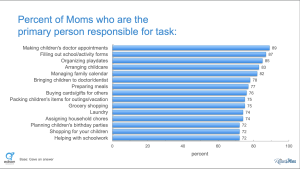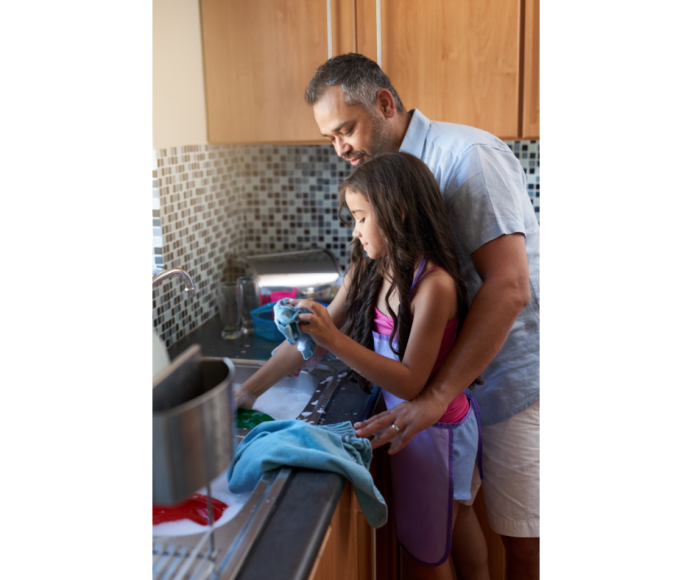At a recent monthly mom’s group meeting, I finally realized why parenting feels so exhausting. A lot of what we do is unseen, even by us. Call it the Motherload, default parenting, the second shift, even married single mom, but essentially moms assume more work at home. After the meeting, a friend said she doesn’t mind all the responsibility because, “Currently it’s my only job.” Yet, research shows even working moms are bearing the brunt of the work.
 This is not to dismiss dad’s contributions. Men are clearly more involved than past generations. Yet the reality is, women have more on their mental plates. Even when the father takes on a task, like taking a child to a soccer game, generally women are handling the details like game time and location, clean jersey, socks, shin guards, cleats, a ball, and water bottle, in addition to sports registration.
This is not to dismiss dad’s contributions. Men are clearly more involved than past generations. Yet the reality is, women have more on their mental plates. Even when the father takes on a task, like taking a child to a soccer game, generally women are handling the details like game time and location, clean jersey, socks, shin guards, cleats, a ball, and water bottle, in addition to sports registration.
Another layer of responsibility assumed by women is the cognitive and emotional aspect of parenting. Is my child happy, healthy, making friends, learning? My daughter began piano lessons in first grade and what started as fun and exciting, soon became frustrating and “too hard.” I used all my best tools (growth mindset, breathwork, hugs), but she was miserable, and frankly, so was I. After a year of communicating with her teacher, consulting other parents, holding her as she cried, and lying awake at night wondering what to do, I finally brought my concerns to my husband. He thought maybe she was too young, but I knew other kids in lessons without the same struggles. Somehow, this landed in my court.
 Ultimately, I decided to make her take a break, because despite her intelligence and desire, her perfectionism would not allow her to trust the process. Music can only evolve through mistakes and errors.
Ultimately, I decided to make her take a break, because despite her intelligence and desire, her perfectionism would not allow her to trust the process. Music can only evolve through mistakes and errors.
With all these macro and micro decisions resting on the shoulders of women, it’s no surprise we are stressed. If the ship sinks, who is accountable? The Captain. This disproportionate mental load leaves women feeling exhausted, unseen, even empty inside. We are literally “too tired” for intimacy and possibly too bitter to connect with our partner.
According to therapist Kate Early, mom burnout is very common and can also impact women’s physical health (migraines, tension, digestive issues, insomnia, and fatigue) and behavioral health (eating to soothe, drinking alcohol to calm down, overscheduling, and neglecting exercise). Finding balance is key.
Lighten the Load
Women might be the Captain, but every good captain must delegate. As a perfectionist, I have a hard time releasing control. When I host parties, the first guest always asks, “How can I help?”, and I always say, “Oh I got it”. I hate the energy it takes to pull apart my mental checklist. However, I’ve recently forced myself to accept their help.
I’ve been practicing this with my kids, too. If they only see me refusing help, it sends the message mom doesn’t need help, perpetuating the imbalanced workload. It feels uncomfortable to loosen the reins because mishaps create new lists of responsibilities, but giving kids age-appropriate jobs builds their confidence and skills.
 Invite your partner to help more too, but remember, no one will do it “just like mommy” and that’s okay. Micromanaging creates decreased trust, insecurity, not to mention a loss in creativity. Give dad space to find his way, free from interference or judgment.
Invite your partner to help more too, but remember, no one will do it “just like mommy” and that’s okay. Micromanaging creates decreased trust, insecurity, not to mention a loss in creativity. Give dad space to find his way, free from interference or judgment.
The idea of redistributing work frustrates many women, according to Early. Why can’t he just sense that I’m overworked and offer to help? From his perspective, the system appears to work. Things get done. However, if you replace the “he should know” with “he needs to know”, this can be the beginning of a productive conversation, not about who does what, but how this affects your health and relationship.
Practice Self-Compassion
Society seems to be shifting from obligation (moms must do it all) to honor (moms can do it all). Sadly, many of us aren’t just trying to do it all, but do it perfectly and that extra pressure is dangerous.
You may not identify as a perfectionist, but moms all could benefit from more self-compassion. Without it, we lack perspective and tend to overreact. You wouldn’t dare tell another mom she’s stupid for forgetting today was an early dismissal, so why say that to yourself? Acknowledge your frustration, but forgive yourself and move forward. Our kids need to see this from us.
Women are not inherently better at multitasking than men, it still impacts performance. Try giving your attention fully to one task, without worrying about past mistakes or future obligations.
Take a Mommy Break
When we are depleted, we are less patient, which makes us a less compassionate parent and spouse. Mom, give yourself a break. A true break. Take a walk. Attend a concert. Have a girls weekend. But please, leave behind the dishes, toys, and the cooking (that is all part of the break).
 We may not get to a point where the parent load is equal, but hopefully mothers feel brave enough to ask for help, fathers are willing to contribute more, and mothers feel worthy of me-time.
We may not get to a point where the parent load is equal, but hopefully mothers feel brave enough to ask for help, fathers are willing to contribute more, and mothers feel worthy of me-time.
 Christina Corcoran moved to St. Louis in 2004 after completing her bachelor’s degree from University of Missouri. She studied journalism, but found her way to sociology. She and her husband started their family in Soulard and after having their second child, moved to Webster Groves. She mostly identifies as a stay-at-home mom, but makes time for writing, reading, and gardening. Currently she is working on a book about perfectionism in young children and how parents can help them cope with fear, shame and insecurity. You can find more information on her website: www.christinacorcoran.com.
Christina Corcoran moved to St. Louis in 2004 after completing her bachelor’s degree from University of Missouri. She studied journalism, but found her way to sociology. She and her husband started their family in Soulard and after having their second child, moved to Webster Groves. She mostly identifies as a stay-at-home mom, but makes time for writing, reading, and gardening. Currently she is working on a book about perfectionism in young children and how parents can help them cope with fear, shame and insecurity. You can find more information on her website: www.christinacorcoran.com.










